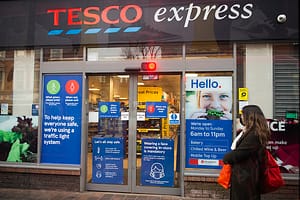New data from The Food Foundation, published today as part of its Kids Food Guarantee programme, has found that:-
The Food Foundation worked with Questionmark Foundation, an international non-profit think tank, to monitor the price and availability of fruit, veg and wholegrain products (pasta, bread, rice, noodles) across seven major UK retailers including Aldi, ASDA, Morrisons, Iceland, Sainsbury’s, Tesco and Co-op, with data collected in November 2023.
Fruit, veg and wholegrain products were the focus of the study as they are items that are essential for a healthy diet.
More than 1 in 7 (14%) of the lowest priced fruit and veg products across the seven retailers looked at contained added sugar and/or salt. Vegetables were more likely to contain added salt or sugar than fruit products, with baked beans, tinned peas and tomato sauces most likely to contain added salt and sugar.
This is concerning given that young children are advised to have only very limited amounts of salt and added sugar in their diets, and these products cannot be purchased with Healthy Start vouchers so low income families will be more limited in their options.
The study found a week’s worth of fruit and veg (at least 35 portions) for one person can be purchased for less than £14. Fruit is on average twice as expensive as vegetables, at 19p per portion compared to 10p per portion for veg.
The average weekly expenditure on food per person for the poorest 10% of UK households is £25 per week, compared to £50 for the wealthiest 10% of households. This means that even if poorer families were buying the lowest priced fruit and veg available, it would cost between 34-52% of one person’s weekly food budget to afford a week’s worth of 5-a-day. This compares to 17-26% for the wealthiest 10% of families.
It is little surprise that consumption of fruit and veg is where the widest inequalities are seen between high and low income households. The National Food Strategy showed that just 55% of low income households meet the 5-a-day recommendation compared to 85% of the highest income households.
The Food Foundation staff and Young Food Ambassadors visited 30 stores across the UK to spot test how widely available the ten lowest cost fruit and veg items for each retailer are. They found that the majority of the stores (60%) had 5 or less of the 10 lowest cost items identified in stock. On average stores had 5 items available, although this was lower in the local/express stores visited, where an average of 4 low-cost fruit and veg products were available.
The study also shows that wholegrain items can be difficult to access. Across all four carbohydrate categories looked at (pasta, rice, bread, noodles), most available options are white, unrefined products. Just 1 in 6 (16%) of all products were wholegrain, whole wheat, brown, or 50:50, with only 6 whole wheat noodle products available across all 7 retailers.
Additionally, the price of wholegrain and brown products is, on average, higher than the closest comparable low cost white product across all 4 categories making it difficult for low income families to buy healthier products.
The average price difference is greatest in the rice category, where on average it costs 77p more per 100g to buy brown rice compared to similar white rice products.
Surveys show that 95% of adults don’t eat enough wholegrains (a great source of fibre) and nearly one in three get none at all. Intakes of fibre are also very low, with just 9% of adults meeting the recommended daily intake of fibre.
Rebecca Tobi, Senior Business and Investor Engagement Manager, The Food Foundation, said, “There are very few people who would argue with the fact that fruit and veg should be the absolute cornerstone of a healthy diet.
“Which is why it’s crucial that supermarkets and policy makers act to close the inequality gap when it comes to supporting low income households to access and afford healthy staples.
“The Eatwell Guide and a large body of evidence supports the critical role fruit, veg and wholegrains ought to play in a healthy, balanced diet. But our food environment is setting families up to fail, with the healthiest options often the hardest to easily access and afford.
The government ought to ensure the cost of a healthy diet as recommended in the UK’s healthy eating guidance is factored into benefits and minimum wage levels. And retailers need to do more to ensure that competitively priced healthy essentials are available across all product categories, and in all stores.”
Rushda, 15 from Halifax, is a Food Ambassador for The Food Foundation and took part in the research, testing which of the cheapest fruit and veg products listed online could be found in store.
She said, “Everyone should have access to fruits, vegetables, and whole grains because they are packed with essential nutrients that our bodies need to stay healthy as they can help prevent diseases and boost our overall well-being.
“It’s important for everyone to have the opportunity to make healthier choices and lead a balanced lifestyle. It’s unfair that healthy food options can be more expensive compared to unhealthy foods.
“It can make it challenging for people to make healthier choices, especially those on a tight budget. As access to affordable and nutritious food should be a priority for everyone. It’s important for communities and policymakers to work together to address this issue and make healthier options more accessible and affordable for all.”






Leave a Comment